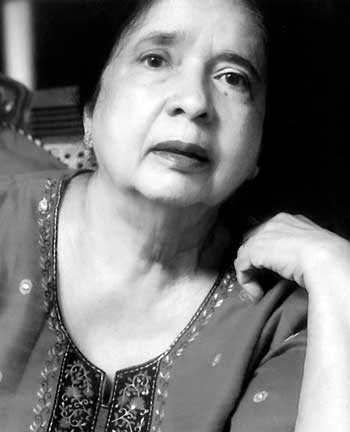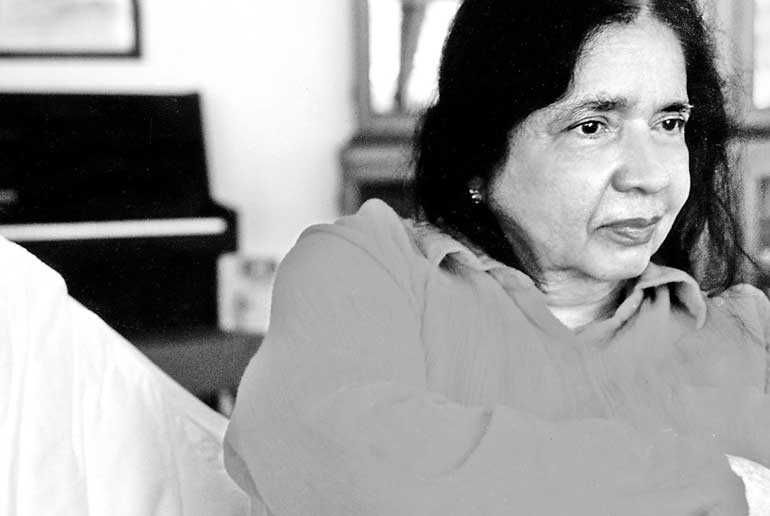Sunday Feb 22, 2026
Sunday Feb 22, 2026
Saturday, 3 August 2019 00:05 - - {{hitsCtrl.values.hits}}
 By Harshana Rambukwella
By Harshana Rambukwella
Kindura
Feathers slice off your waist,
Tail plumes splay the air,
Claws grasp earth,
Fingers touch flute,
Music twitters from those human lips,
Your imperturbable profile
Does not suggest
Discrepancy of disembodiment,
Yet your folded wings,
Unruffled feathers
Suggest an immobility
Of flight arrested,
And I see in my own
Submerged personality,
A strange, restless,
Ghost of Kindura.
(Jean Arasanayagam 1973)
 My first memories of Jean Aunty are from the suburb of Watapuluwa in Kandy where the Arasanayagams were our immediate neighbours. Our house was on a small hillock and they lived immediately below us.
My first memories of Jean Aunty are from the suburb of Watapuluwa in Kandy where the Arasanayagams were our immediate neighbours. Our house was on a small hillock and they lived immediately below us.
The compounds in the Watapuluwa housing scheme were generous 40-perch blocks of land which were separated by nothing more than patchy live fences. Food, neighbourly affection, dogs and cats and many other things including books flowed freely between these porous borders. It is within this small domestic economy that my first substantive encounters with literature in English began to form.
Food flowed from our house and literature flowed in return from the Arasanayagams. The bonds were strengthened because my father and Jean were contemporaries at Peradeniya and were connected in other ways as English teachers.
I did not come from a household where literature in English was common currency. But the Arasanayagams’ house literally overflowed with literature. Books occupied and spilled out of every conceivable surface and the house itself was in perpetual disarray. It is in this strangely magical space that I began to form a love for literature and reading.
Jean gave her time and knowledge generously and she, Arasa Uncle and their two daughters Parvathi and Devasundari collectively created an atmosphere where literature and a world of imagination came alive. I did not realise it at the time but the encounters with Jean left a deep and abiding impression on me – one that would later develop into literature becoming an avocation.
Perhaps the most enduring memory of Jean was one darkened by the tragic ethno-nationalist history of Sri Lanka. But one, which in many ways captures how the personal and the political mingle in our lives – both hers and mine.
When Black July 1983 happened, I was a nine-year-old boy with little or no understanding of the dark political undercurrents of postcolonial Sri Lanka. But they came home to Watapuluwa in the form of a mob that set fire to the Arasanayagams’ Tamil neighbours’ house and threatened to attack the Arasanayagams themselves – on account of Arasa Uncle’s Tamil identity. Jean and the two daughters sought refuge in our house and uncle at a neighbours’ until the Army arrived and took them to a refugee camp.
The only real emotion I can recall from that time is a little boy’s excitement at this sudden turn of events in an otherwise mundane suburban existence. Reflecting on this moment as an adult I can only marvel at the fortitude and composure with which Jean faced this moment of existential threat. But this experience had left something in me – something to which I would turn much later as an undergraduate student.
Year 1983 of course marks a turning point in Jean’s career as a writer and poet. By this time, she was already well-known and critically acclaimed as a writer. But the tragic events of Black July and her complex identity, as a Burgher woman married to a man from a high caste Tamil Hindu background and how this in turn made her a victim of chauvinist Sinhala nationalist forces, propelled her writing to national and international recognition.
Her narrative voice became one intimately identified with the violence of the Sri Lankan post-independence nation state and the multiple ways in which it excluded people. Speaking from a doubly or triply marginalised space, Jean’s poetry became iconic signifiers of the cultural politics of nationalism.
The poem I quote at the beginning of this tribute captures the multiple contradictions and potentials of her identity. In the restless energy of the Kindura – half bird, half human – Jean sees herself – constrained and inhibited by the cultural and political forces of mainstream society but full of the promise and potential of a hybrid being.
Post-1983 this becomes an abiding and dominant theme in Jean’s poetry and prose. In a richly-suggestive and lyrical language she begins an intense and passionate exploration of her divided identity which in turn produced a rich, varied and challenging body of literature that constantly reminds us that Sri Lanka is a place of many peoples, many cultures and many belongings.
After my boyhood encounters with Jean Aunty it is to this body of literature I turned as a young undergraduate. I wrote my undergraduate dissertation at Peradeniya on Jean and later as a postgraduate student at the University of Hong I was able to convert and publish this as a journal article. At each stage of the maturation of this work I kept in touch with Jean.
It is never an easy experience for an author to encounter their work as interpreted by others but she readily read, commented and critiqued my analysis of her work and it was a singular pleasure and privilege as a literary critic to have direct access to the author whose work you were critically exploring.
It is also through Jean’s work that I developed a sense of the politics of belonging and unbelonging in Sri Lanka. Nationalism, which has since become my most dominant scholarly preoccupation, was literally and figuratively shaped by the presence of Jean in my life.

I want to conclude with the exuberance that characterised Jean Aunty as a person. She was loud, opinionated and passionate. Whether it was praise or critique, it was given in full measure. As a young boy I was always afraid when she boarded the bus. Suddenly a sonorous voice would boom out your name across the aisle of the crowded bus and you would cringe in embarrassment as she would ask the most personal questions or shower you with effusive praise – “you are such a good boy, how is your wonderful mother?” – completely oblivious to the bystanders fascinated by this spectacle.
Years later when I met her as an adult at a State Literary Festival at the BMICH, nothing had changed. Despite the location and despite the formality of the event, she hailed me across an aisle and proceeded to happily interrogate me about my personal life – much to the amusement of a curious audience of VIPs.
This exuberance was also on full display when Jean won the 2017 Gratiaen Prize. In typical fashion she dispensed with all decorum, embraced her win with full passion and proceeded to address the audience with so much energy that those of us in the front rows feared the microphone would fly out of her hand.
Her performance was so singularly remarkable in the staid world of literary prizes that my friend Janaka Inimankada from the Sinhala literary world posted an account of it on Facebook, admiring the effusive joy with which Jean embraced her win. For me it was also a particularly gratifying moment to see her win the Gratiaen – the one Sri Lankan literary prize that had eluded her for many years.
Jean’s demise leaves a vacuum in Sri Lankan writing in English. She was one of the pioneers of Sri Lankan writing in English who took our writing to the world and helped place Sri Lankan writing in English on the global literary map. The singularity of her personality and poetic vision will remain unmatched.
Her passing also marks the passing of a generation that experienced 1983 as a defining moment in the postcolonial history of this country and a generation that was mature enough to craft an enduring literary-cultural legacy out of this trauma. But knowing Jean Aunty, it is not with solemnity and sombre reflection she would want to be remembered – rather it would be with the exuberance of her Kindura-like hybrid life.